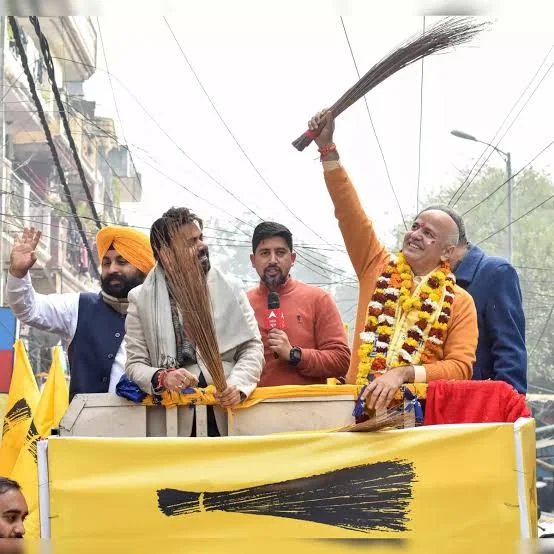Communal consensus? Soft Hindutva is integral part of majoritarian politics for which RSS/BJP is criticized
While outrightly opposing the hard-line Hindutva of the RSS/BJP, scholars from the secular camp refer to the soft Hindutva of secular parties, as if using soft Hindutva to gain political power is a constitutionally secular practice. Without hesitation, they place their bets on soft Hindutva political parties and leaders, believing that these can prevent the hard-line Hindutva RSS/BJP from winning elections. It seems not to matter even if the party or leader in question is part of the BJP-led National Democratic Alliance (NDA).
Two outcomes emerge from this political behavior: first, secular parties receive a kind of validation for practicing soft Hindutva or being part of the BJP-led alliance. They can continue to present themselves as constitutionalists even while engaging in Hindutva politics, and they can, without hesitation, claim to be defending the Constitution from the perceived threat of the RSS/BJP. Secondly, the political power of the BJP, which serves as the political arm of the RSS, keeps growing, and its ideology continues to spread nationwide. Its objective of making Indian politics Hinduism-centric rather than Constitution-centric is thereby easily fulfilled. Needless to say, the BJP is content with just enough constitutionalism to conduct elections and run governments after gaining power. This will likely remain the case in the future, just as other theocratic states also have constitutions that include provisions for democracy and civil rights.
Soft Hindutva parties and leaders argue in their political rhetoric that the RSS/BJP does not have a monopoly on the Hindu religion. The RSS/BJP, however, does not object to such claims, as they ultimately serve its broader ideological goals. When soft Hindutva leaders assert their right over Hinduism and argue before the public that they represent ‘good’ Hindu religiosity as opposed to the ‘bad’ Hindu religiosity of the RSS/BJP, they inadvertently reinforce the RSS/BJP’s ideological influence.
It is worth noting that before Narendra Modi’s rise in Gujarat, the RSS/BJP also operated within the framework of soft Hindutva politics. Atal Bihari Vajpayee, during the BJP’s first national conference in Bombay in December 1980, strongly affirmed the party’s commitment to Gandhian socialism, democracy, and secularism. In his quest for the Prime Minister’s office, Vajpayee would even attend Muslim gatherings wearing a green turban, though he also warned Muslims that the BJP could come to power without their support. Narendra Modi ultimately proved this warning true—first in Gujarat, and later, three times at the national level.
Soft Hindutva parties continue to compete among themselves on the Hindutva platform. Each one attempts to lure the majority Hindu vote away from the RSS/BJP, playing on the latter’s ideological turf in a bizarre manner. Their leaders try to portray themselves as ‘more’ Hindu than their rivals. Meanwhile, most non-BJP parties and leaders consider minorities, especially Muslims, as their core electoral base. This association yields votes, leading to fierce competition to consolidate minority support. The standard justification for this is always the need to save the secular Constitution. Ironically, minority voters themselves seem willing to be politically exploited. At this point, secular scholars intervene, arguing that the burden of safeguarding constitutional secularism falls on minorities and the choices they make in supporting non-BJP parties or leaders.
This art of deception, disguised as constitutional politics, benefits leaders and scholars. But what does this tendency to be deceived actually bring to minorities? That remains a complex question.
A recent example is the Delhi Assembly elections (February 5, 2025). The Left Front fielded five candidates, yet there was little discussion about them among Muslim minorities. Nor was there any notable interest in candidates from small parties outside the mainstream or independents, even if they genuinely believed in constitutional secularism. Initially, some confusion surrounded the Congress, but this was soon resolved, and Muslims ultimately rallied behind ‘Hanuman-bhakt’ Arvind Kejriwal to defeat the BJP. At the same time, Muslim voters remained fairly uncertain about the All India Majlis-e-Ittehadul Muslimeen’s (AIMIM) candidates in two Muslim-dominated constituencies.
Asaduddin Owaisi is attempting to carve out a distinct space for minority communalism in politics. It remains to be seen whether this approach will take the form of soft Islam-atva, hard-line Islam-atva, or a mixture of both. Many more Owaisis may emerge in the future, and there will likely be competition among them. However, all of this will unfold within the larger expansion of communal politics in the country.
My argument is that majority communalism continues to nurture minority communalism for its own benefit. The politics of soft Hindutva is an integral part of the majoritarian politics for which the RSS/BJP is criticized. Hard-line and soft Hindutva are two sides of the same coin.
Just as there is near-universal consensus on neoliberalism among India’s political and intellectual elite, there is a similar consensus on communalism. The neoliberal consensus undermines the socialist values of the Constitution, while the communal consensus weakens its secular values. The RSS/BJP has succeeded in shifting Indian society, along with the Indian Republic, towards communal politics. It should not be surprising if communalism increasingly influences the legislature, the executive, and the judiciary. Just as advocacy for constitutional equality has almost disappeared from the media, so too is the space for secularism rapidly shrinking.
In reality, terms like hard-line Hindutva and soft Hindutva are misleading and should be abandoned. Instead, these political strategies should be referred to as hard-line communalism and soft-line communalism. Doing so would help future generations see through the deception and recognize that there is a broad consensus on communal politics. Most leaders and scholars who claim to be secular are, in fact, active participants in communal politics.
---
The writer, associated with the socialist movement, is a former teacher at Delhi University and a fellow of the Indian Institute of Advanced Study, Shimla


Comments